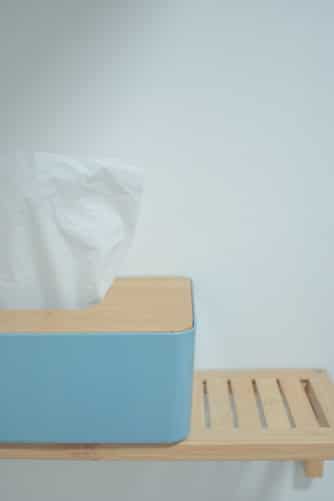If you experience a runny nose and congestion in these winter months, there’s no reason to immediately panic. Once you talk to your doctor and rule out the possibility of COVID-19, you may uncover that the source of your symptoms is in fact a winter allergy. Being able to identify your winter allergy triggers and eliminate them from your home will help you feel your best this season.
What Causes Winter Allergies?

While you don’t have to contend with pollen in the winter, there are still plenty of indoor allergens you could be reacting to. In the cold months, you’re likely to experience sneezing, wheezing and itchy, watery eyes since you spend most of your time closed up inside your warm house.
According to the American Academy of Allergy, Asthma, and Immunology, the most common indoor allergens include:
- Dust mites. Note that it’s not the dust in your home that you’re allergic to, but the microscopic bugs that feed on it. Dust mites thrive in bedding, carpet, curtains and upholstered furniture.
- Pet dander. If you’re allergic to the furry friend you may have picked up at Willamette Humane Society to keep you company during quarantine, know that it’s their dander that triggers a reaction rather than their hair or fur.
- Indoor mold. Whether you like it or not, you likely breathe in mold spores every day. Areas that are most conducive to mold growth include bathrooms, kitchens, utility rooms and basements.
- Cockroach droppings. These pests can live anywhere, and despite popular opinion, they don’t signal that a home is unhygienic or unsanitary. Even so, it’s important to store food in air-tight containers and keep up on cleaning spills and crumbs.
Preventing Winter Allergies
It’s important to prevent winter allergies not only to reduce uncomfortable allergy symptoms, but also because winter weather can turn a mild allergic reaction into something worse.
According to Douglas Jones., M.D., of Rocky Mountain Allergy, Asthma and Immunology Group in Layton, Utah, “People are turning up their heaters, which makes the indoor air even drier, and that leads to dry noses, which increases the incidence of nosebleeds and skin cracking.” This increases risk of infection, especially when the nasal passages are already inflamed due to allergies.
While it may not be possible to eliminate winter allergens completely, these tips can help you reduce exposure:
- Maintain a humidity level around, but not above, 50%
- Remove wall-to-wall carpeting and swap out upholstered drapes for blinds
- Clean, vacuum and dust regularly, using a vacuum with a HEPA filter
- Wash sheets weekly in hot water
- Bathe pets once a week (but not more)
For more information or to schedule an appointment, call Willamette Ear, Nose, Throat and Facial Plastic Surgery today.
Learn More About Allergies
- How Does Allergy Testing Prevent More Serious Conditions?
- Eczema & Allergies
- Allergies & The Immune System
“I came to be under Dr. Donovan's care during a medical emergency at the hospital. The care I received that day and in every interaction after, at Willamette ENT has been prompt, professional and very thorough. I feel very well cared for.”